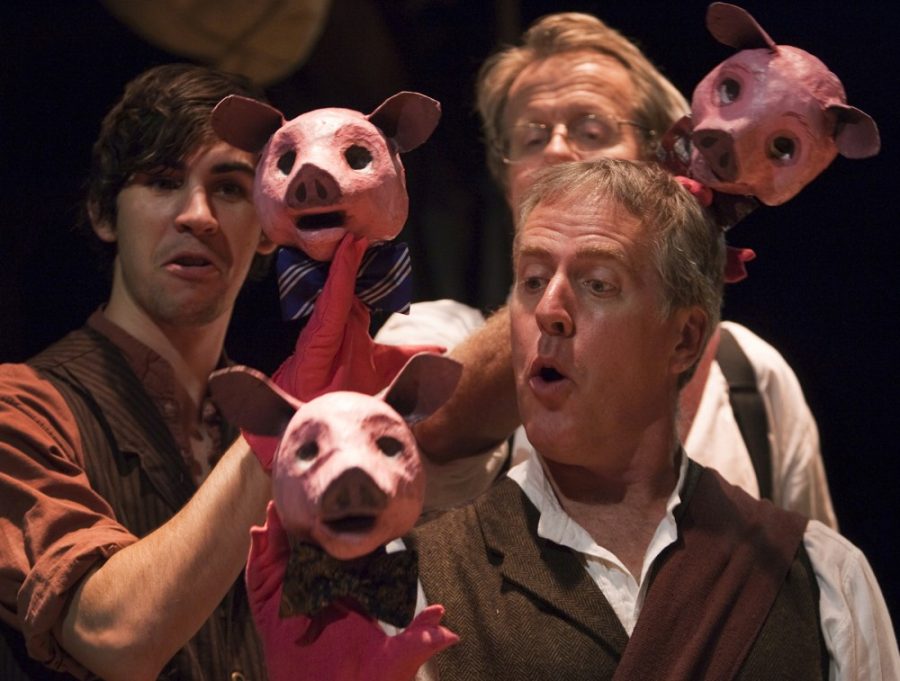If one hasn’t thought about “”Animal Farm”” since high school English class, here is the perfect opportunity: in just under two hours, The Rogue Theatre’s current production teaches more about political science, literature and the nature of humans than all general education classes combined.
In Andrew Periale’s adaptation, George Orwell’s classic allegory feels rough and earthy, delving into the most important issues of life while adults play-act as chickens and horses. It’s a precarious balance, but one that the cast at The Rogue executes with furious grace. The accomplished ensemble is a spirited delight to watch, even when the audience happens to lose track of the hasty and complicated plot.
While the adaptation does a fine job supporting the girth of Orwell’s heavy ideas, Periale’s script seems a bit green. Certain sequences, such as the opening scene, lack the polish of a more subtle or seasoned work. The conceit is very high-concept, almost too much so: each actor plays several animal and human characters, and only the most attuned theater-goer could follow every personality switch as well as comprehend Periale’s (and Orwell’s) intentions at the lightning speed of the production.
There are very few scenes that feature only two actors, and even fewer that feature two actors playing only two characters. It is a frantic combustion of brains, ambition and big ideas at a dizzying speed, but this head rush is more exhilarating than stomach-turning.
Nearly all of the political points made in Orwell’s 1946 novella are on display here, though modern “”Farm””-ers may not take them now in their original context of satirizing Stalinist Russia. Religion, unions, and, of course, government are all scrutinized through the lens of the barnyard, and none survive unscathed. Periale also skewers modern issues such as health care and education in his high-reaching satire, playing lines about legalizing gay marriage to make the audience laugh, but also make his point.
The show plays like a heady fever dream in minor keys, with everything from the frantic pace to the smell of hay colliding to create a deeply organic and overwhelming piece. Innovative creative choices turn what might have been an almost-silly puppet show into an aggressive work of importance both timeless and immediate.
Aside from playing several characters in each scene, the cast also addresses the audience directly, asking them to sing, chant, or play along with the action of the story. This breach of the fourth wall could have been cheesy or immature, but here it reads as a further underscore of the important themes of the piece. If a pig puppet can get a room full of people to chant, “”four legs good, two legs bad,”” one believes uncomfortably anew that groupthink is both real and dangerous.
The cast is enthusiastic and efficient, never seeming out of breath in the whirlwind of the story. Jill Baker’s performance as Clover is especially charming: the script leaves her almost no room to develop her character’s relationship with Daved Wilkins’ endearing Boxer, but Baker still makes the scene when Boxer is taken away to die quietly and deeply affecting.
Wilkins’ Boxer is the hero of the play (if there is one) in his solid turn as the long-laboring, long-suffering lead horse. His protest in defense of the vilified Snowball is moving and nuanced, leaving the audience with a gravely puzzled feeling to mirror Boxer’s own.
Avis Judd plays the pampered and vain Mollie, and she does well as one of the few characters who doesn’t support the revolution. “”This isn’t freedom,”” she says, with both passion and restraint, of the results of the uprising, “”not for me.”” Judd also delivers one of the most serious and jarring lines of play, when she speaks from the dimly-lit center of the stage: “”We have come to a place where no man dare speak his mind.””
Rogue Artistic Director Joseph McGrath and Artistic Associate David Morden play the two most famous swine characters, Snowball and Napoleon. McGrath’s soliloquy about the future of the revolution is one of the most traditional scenes of the play, but the accomplished actor plays Orwell’s words with such tenderness that it also feels like one of the most fresh.
Morden is twistedly fascinating as the vain and selfish pig-in-chief Napoleon, holding little heart for his character (who was inspired by Bolshevik revolutionary and Soviet dictator Joseph Stalin). As Morden contorts his face into Napoleon’s sanguine expression and delivers his incendiary lines in a squeaky, grating voice, the audience themselves might feel a need for an uprising against him.
John Shartzer (who is a member of the UA’s own improv comedy group The Charles Darwin Experience) makes a particularly good chicken, and his eerily accurate animal sounds and mannerisms are both amusing and affecting. Shartzer provides much of the needed levity in the piece with his comic timing and frictionless singing, but he also delivers some of the most vital lines.
When Baker’s Clover asks if the rules of the revolution have changed, Shartzer leaves the animal affectations aside as he says gravely, “”It’s better that you don’t know.”” His performance is bracing, lively and delicately apologetic when he explains, “”All animals are equal … but some are more equal than others.””
The denouement draws to a close both fine and complex, with a golden-hued stage that fades to darkness as both the characters and the audience are transformed. The pace is breathless, the subjects are heavy, and the impact is deep — in the best possible way.
As some animals are more equal than others, so too are theatrical productions. This one, comrades, is exceptional.









